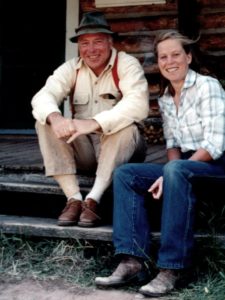Beirne Blair Carter (1924 – 1989)

The Beirne Carter Foundation was established in 1986 by Beirne Blair Carter, Chairman and Chief Executive Officer of Carter Machinery Company, Inc. of Salem, Virginia.
At the time he created the Foundation, Mr. Carter placed an emphasis on health, education, local history, nature, ecology and youth as areas where he foresaw opportunities to help. At the same time, he stated that he did not wish to restrict the Foundation and expected it “to respond in a flexible manner to changing needs.”
Prior to his death in 1989, Mr. Carter made several significant grants, including:
- The North Cross School, Roanoke, Virginia – $4,000,000
- St. Christopher’s School, Richmond, Virginia – $1,000,000 (the largest gift received as of that time)
- University of Virginia, Charlottesville, Virginia – $3,500,000 leading to the establishment of the Beirne B. Carter Center for Immunology Research. Additional areas of support included the McIntire School of Commerce, Darden School of Business, and Nursing School.
- Virginia Military Institute, Lexington, Virginia – $250,000
Mr. Carter was a native of Richmond, Virginia and graduated from St. Christopher’s School. He attended Virginia Military Institute before being called to active duty in the United States Army in World War II. For wounds received in Achen, Germany, Mr. Carter received the Purple Heart. Following the war, Mr. Carter resumed his studies at the University of Virginia where he received a Bachelor of Science in Commerce degree from the McIntire School in 1948.
Mr. Carter began his business career with Virginia Tractor Company, Inc. in Richmond, a firm founded by his father, Robert Hill Carter. In 1952, Mr. Carter established Carter Machinery in Roanoke as a separate Caterpillar dealership, covering southwest Virginia and areas of southern West Virginia. In 1988, Carter Machinery expanded its territory to cover most of the Commonwealth of Virginia and to become one of the largest and most successful Caterpillar dealerships in the country.
In the area of philanthropy, Mr. Carter will be remembered not only for his generosity but also his vision. Perhaps, the finest example of both was the creation and initial funding of the Beirne B. Carter Center for Immunology Research at the University of Virginia. Mr. Carter was also interested and supportive of many less noteworthy projects, particularly those involving organizations without ready access to funding. Mr. Carter never forgot the challenging times involved in beginning a business. Behind his desk was a framed copy of a commercial note in the amount of $10,000 that one of his earlier bankers had “called”.
The Beirne Carter Foundation, although founded by a former chief executive officer of Carter Machinery Co., Inc., is an independent charitable organization with no connection to any other corporate entity.
Beirne B. Carter Center for Immunology Research
The Beirne B. Carter Center for Immunology Research (BCIC) at the University of Virginia was founded through the generosity of Beirne B. Carter, and the Foundation continues to support its efforts. The researchers in the BCIC work to provide a better understanding of hepatitis C, influenza, cancer, RSV, AIDS, and autoimmune disorders, helping find new treatments and cures. Research “seed funds” from the Foundation have resulted in advances in human health, as well as significant NIH funding and other grant support for researchers in the Center. In 2002, the Foundation made a $5,000,000 multi-year pledge toward expansion of the BCIC into new space in a new medical research facility at the University named the Carter-Harrison Research Building.
The Carter-Harrison Research Building, completed in 2009, is a 150,000 square foot research facility that brings together nationally renowned experts in immunology, infectious diseases, and cancer. BCIC currently occupies an entire floor of the new building and is strategically located near other researchers with similar interests. The research conducted in the Carter-Harrison Building will provide hope for millions whose immune systems are functioning improperly, or those who have been ravaged by infectious disease or cancer.
Visit The Beirne Carter Foundation website for more information.
